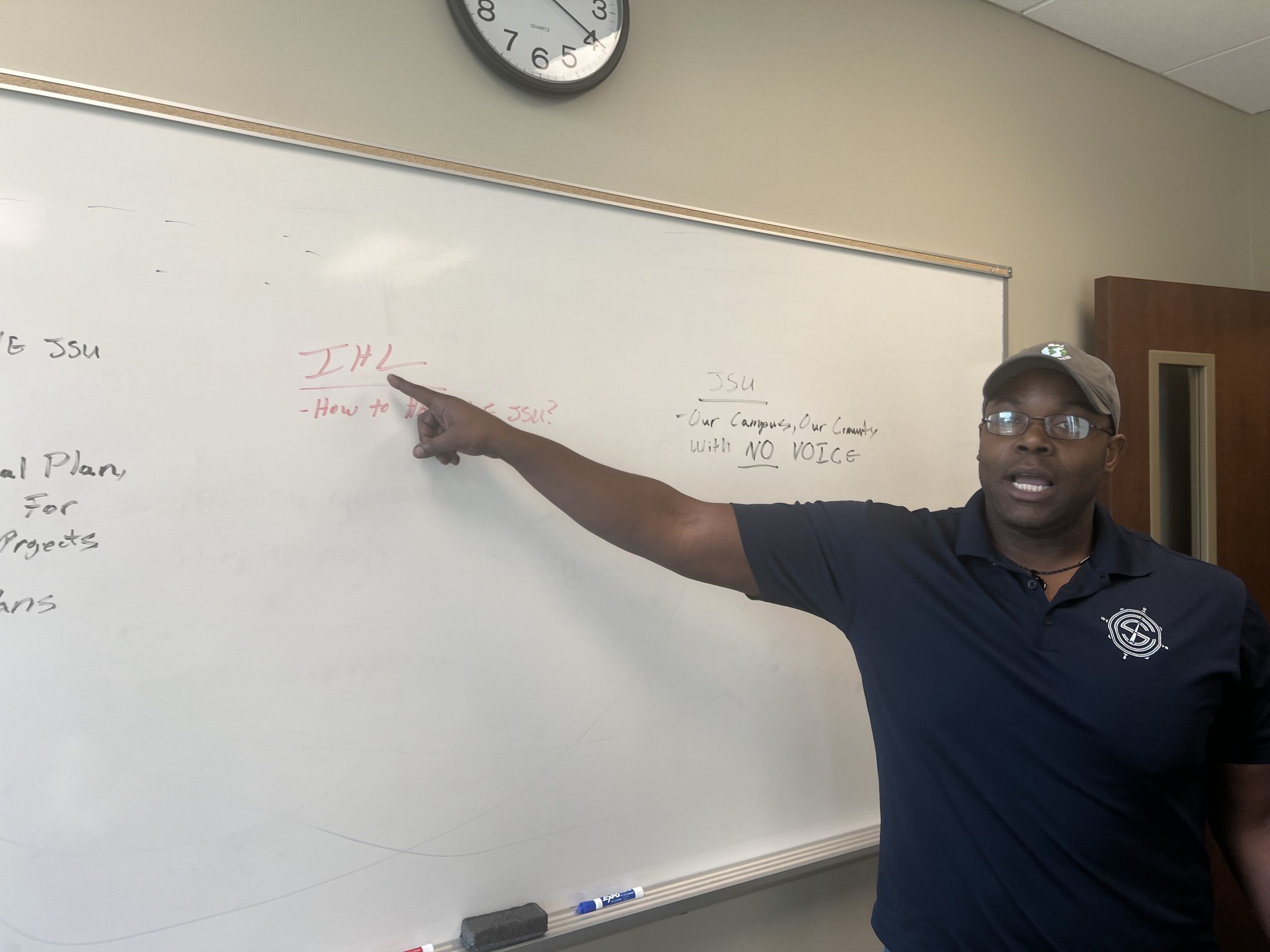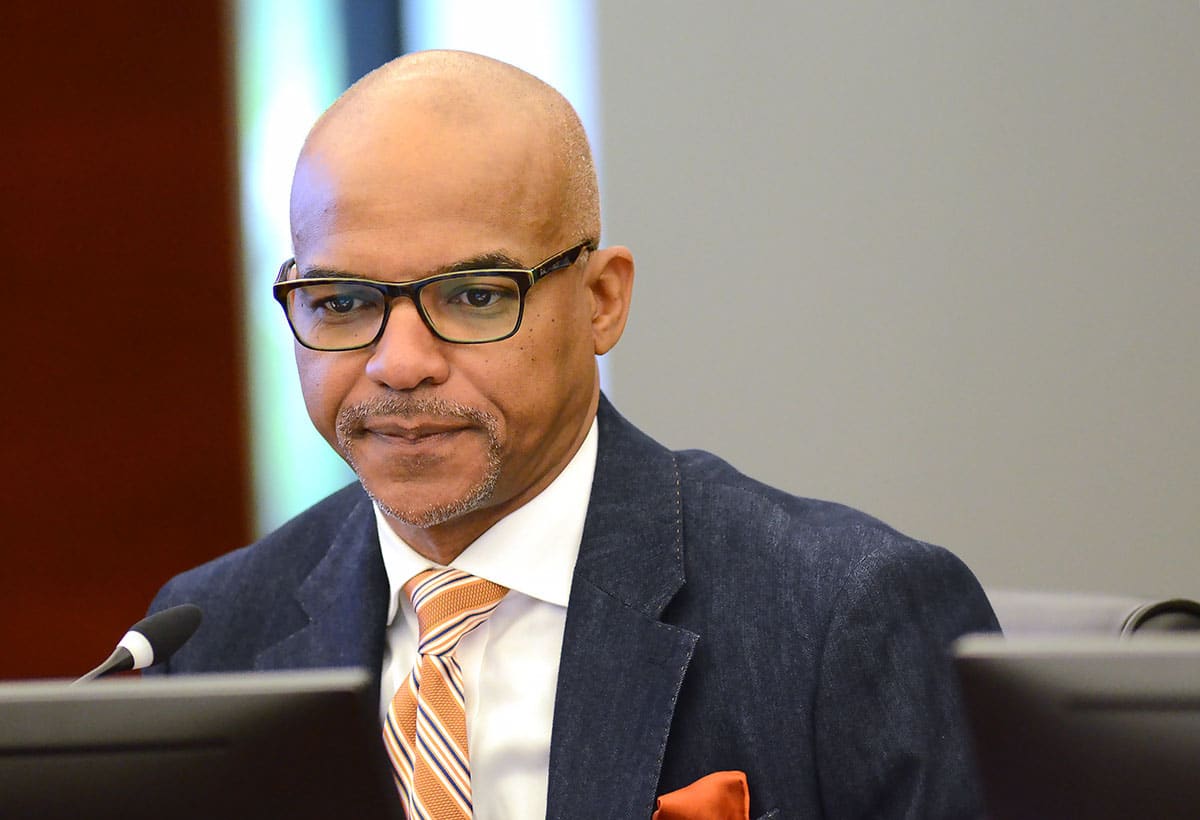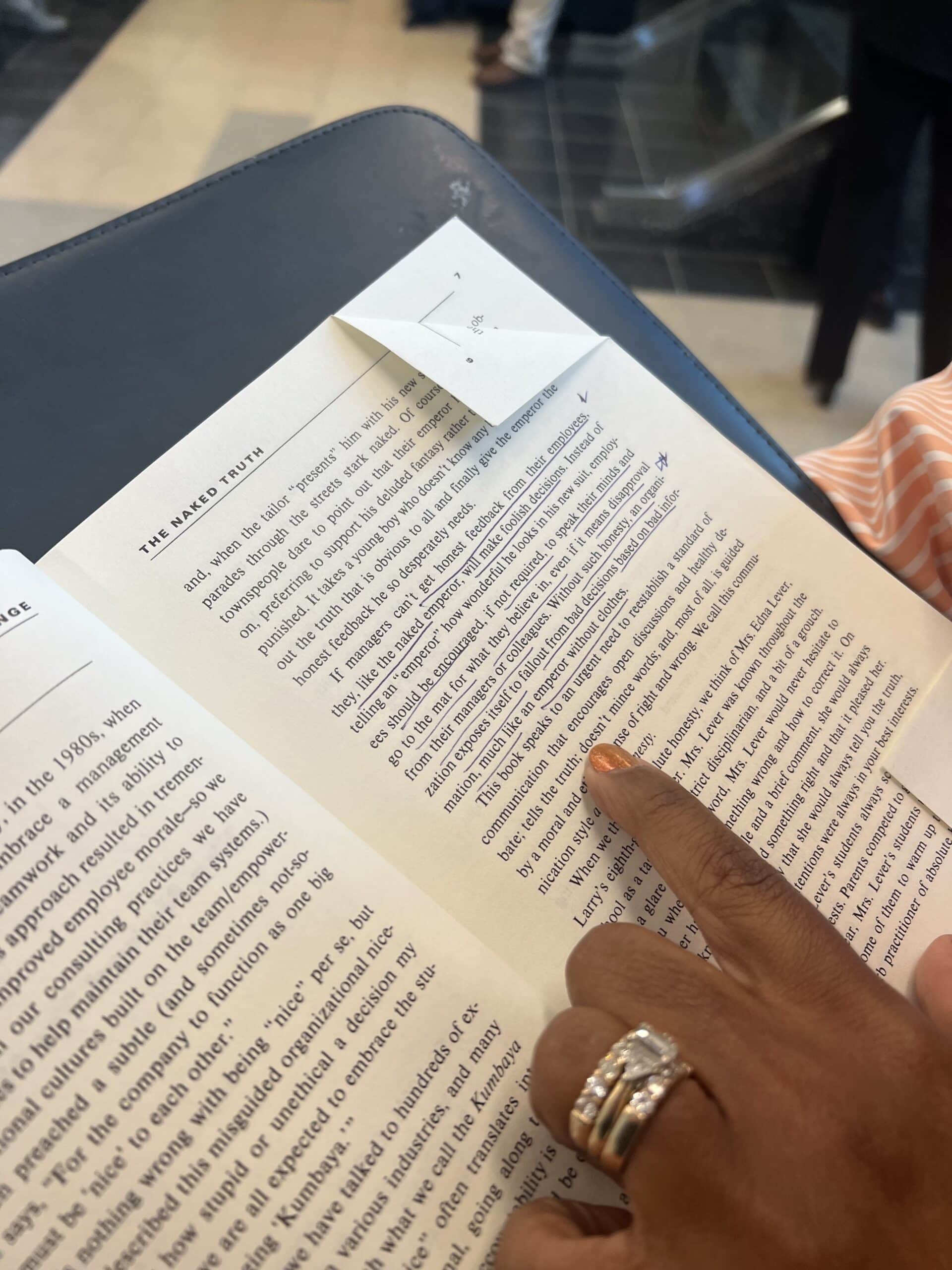Mississippi Today
JSU waits for news from IHL as trustees interview finalists behind locked doors

William Brown and Millard Bingham, standing with their arms crossed, are waiting in a hallway of classrooms for the executive session to end, hoping it’ll bring some information about who is going to be the next president of Jackson State University.
But Brown and Bingham know it probably won’t. At least not today.
The two professors have waited many times before. In their two decades of teaching at Jackson State, they’ve seen four permanent presidents come and go from the historically Black university. And each time, they’ve watched as the search process used by the university’s governing board, the Institutions of Higher Learning Board of Trustees, has become more and more secretive — to the point that now, transparency “just seems like an unattainable dream,” Bingham said.
“It feels like the fix is in, to be honest with you,” he added.
“Well, I can tell you that God is not pleased,” Brown stated. “It’s sort of like we’re in the dark ages.”
One thing is certain: Acting president Elayne Hayes-Anthony is not a finalist for the position, she confirmed to Mississippi Today.

About an hour earlier, at 8:30 a.m., with two sharp bursts of a gavel, Steven Cunningham, the only Jackson State alumnus on the IHL board and the trustee chairing the search, brought the special-called meeting to order in a small conference room packed with people at the University of Mississippi’s School of Pharmacy, a few miles away from the board’s usual meeting place.
Sitting at the table with Cunningham were two other trustees, the commissioner and William Kibler, a consultant for Academic Search, the executive headhunting firm that IHL had contracted, who had a white binder closed in front of him.
“Thank you trustees for taking the time to participate in this very important meeting,” Cunningham said, reading a printed statement.
Then he made a motion for executive session, which passed.
“If you’re not an IHL trustee, you’re welcome to wait in the lobby or in one of the classrooms in the adjacent hallway,” Cunningham read.
With that, about 15 members of the public were shepherded from the room as seven security guards watched. Uncomfortable with the guards, some people left.
Behind them, Glynn Babb, an emergency and safety officer for IHL, and a UMMC security guard shut the conference room door and, for good measure, automatically locked the double-doors that lead to the hallway, the windows taped-up with paper.
“So they don’t get pictures of them coming in and out,” Babb told the guard before requesting members of the public to move away from the doors.
“It’s the secrecy,” he tells a reporter. “Not really protection.”
“Glynn’s not authorized,” interjected Kim Gallaspy, a spokesperson for IHL.
A few feet away, Dawn McLin, a Jackson State professor and the faculty senate president, stood off to the side. She had come hoping to ask Cunningham and the IHL commissioner, Al Rankins, a few questions. Namely, she wanted to know why they had not responded to her repeated emails asking for basic information about the presidential search, such as a rough timeline, which she did not see until Mississippi Today published it.
Even though she was a member of IHL’s search advisory committee, IHL had not provided McLin with any notable information about the search.
But they had asked her and other advisory committee members not to talk to the media.
“They said we should all be speaking in one voice, but it’s concerning when that one voice isn’t giving all of us information about the search process,” she said.

If there were one thing she could tell IHL, McLin said, it would be in line with the title of a book about corporate management called “Absolute Honesty” that, if given the opportunity to comment, she had planned to read.
She had also hoped to express her support for Hayes-Anthony.
“This feels like we have a pilot that you all put on this seat to fly this plane and now halfway to our destination you’ve told this pilot to eject,” she said. “What measures are you putting in place for those on the plane to keep us from crashing? You’re getting some stability but it’s like everyone has to hold their breath. You know you can’t hold your breath waiting forever.”
Without more transparency, McLin said she feels like IHL is setting up the next president of Jackson State for failure. She doesn’t want a repeat of William Bynum Jr., whom IHL appointed president even though he was not initially a finalist, or Thomas Hudson, who resigned for reasons that still have not been shared with the public. Bynum, who was hired from Mississippi Valley State University, resigned in 2020 after he was arrested in a prostitution sting.
“Their past appointments have shown you their results,” she said. “The proof is in the pudding.”
Other attendees were just as disappointed. Monica Wilson, a Jackson State graduate, thought she’d pop over to the meeting because she works in Human Resources at UMMC — but she was quickly disabused of that notion.
“My surprise was it was such a small room,” she said. “I’m not even in the room. I’m at the door looking in. That told me this is not going to be for the public.”
By the time Nike Irving and her husband, Shelton Pittman, had arrived at the meeting around 8:45 a.m., the trustees were already in executive session. They had rushed over after dropping their son off at school. But when they arrived, security guards directed them to a classroom down the hall. Irving, who has a master’s degree from Jackson State, expected one of the TVs to turn on with a broadcast of the meeting.
But it never did.
“I just want to know what they plan to do for the university,” Irving said.
On a whiteboard, Pittman, a military veteran who graduated from the University of Southern Mississippi, wrote out his thoughts on IHL’s search process, which he referred to as “foolishness.”
“At this particular moment,” Pittman said, “I don’t think IHL nor the kids and young adults can withstand—”
“Another person quitting on them,” Irving concluded.
When they left, the doors to the School of Pharmacy building locked behind them.
Five-and-half hours after closing the doors, trustees emerged. Cunningham said they took no action.
Cunningham couldn’t say if every finalist has a doctoral degree — which the search profile stated was preferred but not required — and wouldn’t say how many finalist there were. He added that he didn’t know how the community was coming up with rumors.
“Nature abhors a vacuum,” he said.
This article first appeared on Mississippi Today and is republished here under a Creative Commons license.
Mississippi Today
1964: Mississippi Freedom Democratic Party was formed
April 26, 1964

Civil rights activists started the Mississippi Freedom Democratic Party to challenge the state’s all-white regular delegation to the Democratic National Convention.
The regulars had already adopted this resolution: “We oppose, condemn and deplore the Civil Rights Act of 1964 … We believe in separation of the races in all phases of our society. It is our belief that the separation of the races is necessary for the peace and tranquility of all the people of Mississippi, and the continuing good relationship which has existed over the years.”
In reality, Black Mississippians had been victims of intimidation, harassment and violence for daring to try and vote as well as laws passed to disenfranchise them. As a result, by 1964, only 6% of Black Mississippians were permitted to vote. A year earlier, activists had run a mock election in which thousands of Black Mississippians showed they would vote if given an opportunity.
In August 1964, the Freedom Party decided to challenge the all-white delegation, saying they had been illegally elected in a segregated process and had no intention of supporting President Lyndon B. Johnson in the November election.
The prediction proved true, with white Mississippi Democrats overwhelmingly supporting Republican candidate Barry Goldwater, who opposed the Civil Rights Act. While the activists fell short of replacing the regulars, their courageous stand led to changes in both parties.
This article first appeared on Mississippi Today and is republished here under a Creative Commons Attribution-NoDerivatives 4.0 International License.![]()
Mississippi Today
Mississippi River flooding Vicksburg, expected to crest on Monday
Warren County Emergency Management Director John Elfer said Friday floodwaters from the Mississippi River, which have reached homes in and around Vicksburg, will likely persist until early May. Elfer estimated there areabout 15 to 20 roads underwater in the area.
“We’re about half a foot (on the river gauge) from a major flood,” he said. “But we don’t think it’s going to be like in 2011, so we can kind of manage this.”
The National Weather projects the river to crest at 49.5 feet on Monday, making it the highest peak at the Vicksburg gauge since 2020. Elfer said some residents in north Vicksburg — including at the Ford Subdivision as well as near Chickasaw Road and Hutson Street — are having to take boats to get home, adding that those who live on the unprotected side of the levee are generally prepared for flooding.



“There are a few (inundated homes), but we’ve mitigated a lot of them,” he said. “Some of the structures have been torn down or raised. There are a few people that still live on the wet side of the levee, but they kind of know what to expect. So we’re not too concerned with that.”
The river first reached flood stage in the city — 43 feet — on April 14. State officials closed Highway 465, which connects the Eagle Lake community just north of Vicksburg to Highway 61, last Friday.

Elfer said the areas impacted are mostly residential and he didn’t believe any businesses have been affected, emphasizing that downtown Vicksburg is still safe for visitors. He said Warren County has worked with the U.S. Army Corps of Engineers and the Mississippi Emergency Management Agency to secure pumps and barriers.
“Everybody thus far has been very cooperative,” he said. “We continue to tell people stay out of the flood areas, don’t drive around barricades and don’t drive around road close signs. Not only is it illegal, it’s dangerous.”
NWS projects the river to stay at flood stage in Vicksburg until May 6. The river reached its record crest of 57.1 feet in 2011.




This article first appeared on Mississippi Today and is republished here under a Creative Commons Attribution-NoDerivatives 4.0 International License.![]()
Mississippi Today
With domestic violence law, victims ‘will be a number with a purpose,’ mother says
Joslin Napier. Carlos Collins. Bailey Mae Reed.
They are among Mississippi domestic violence homicide victims whose family members carried their photos as the governor signed a bill that will establish a board to study such deaths and how to prevent them.
Tara Gandy, who lost her daughter Napier in Waynesboro in 2022, said it’s a moment she plans to tell her 5-year-old grandson about when he is old enough. Napier’s presence, in spirit, at the bill signing can be another way for her grandson to feel proud of his mother.
“(The board) will allow for my daughter and those who have already lost their lives to domestic violence … to no longer be just a number,” Gandy said. “They will be a number with a purpose.”
Family members at the April 15 private bill signing included Ashla Hudson, whose son Collins, died last year in Jackson. Grandparents Mary and Charles Reed and brother Colby Kernell attended the event in honor of Bailey Mae Reed, who died in Oxford in 2023.
Joining them were staff and board members from the Mississippi Coalition Against Domestic Violence, the statewide group that supports shelters and advocated for the passage of Senate Bill 2886 to form a Domestic Violence Facility Review Board.
The law will go into effect July 1, and the coalition hopes to partner with elected officials who will make recommendations for members to serve on the board. The coalition wants to see appointees who have frontline experience with domestic violence survivors, said Luis Montgomery, public policy specialist for the coalition.
A spokesperson from Gov. Tate Reeves’ office did not respond to a request for comment Friday.
Establishment of the board would make Mississippi the 45th state to review domestic violence fatalities.
Montgomery has worked on passing a review board bill since December 2023. After an unsuccessful effort in 2024, the coalition worked to build support and educate people about the need for such a board.
In the recent legislative session, there were House and Senate versions of the bill that unanimously passed their respective chambers. Authors of the bills are from both political parties.
The review board is tasked with reviewing a variety of documents to learn about the lead up and circumstances in which people died in domestic violence-related fatalities, near fatalities and suicides – records that can include police records, court documents, medical records and more.
From each review, trends will emerge and that information can be used for the board to make recommendations to lawmakers about how to prevent domestic violence deaths.
“This is coming at a really great time because we can really get proactive,” Montgomery said.
Without a board and data collection, advocates say it is difficult to know how many people have died or been injured in domestic-violence related incidents.
A Mississippi Today analysis found at least 300 people, including victims, abusers and collateral victims, died from domestic violence between 2020 and 2024. That analysis came from reviewing local news stories, the Gun Violence Archive, the National Gun Violence Memorial, law enforcement reports and court documents.
Some recent cases the board could review are the deaths of Collins, Napier and Reed.
In court records, prosecutors wrote that Napier, 24, faced increased violence after ending a relationship with Chance Fabian Jones. She took action, including purchasing a firearm and filing for a protective order against Jones.
Jones’s trial is set for May 12 in Wayne County. His indictment for capital murder came on the first anniversary of her death, according to court records.
Collins, 25, worked as a nurse and was from Yazoo City. His ex-boyfriend Marcus Johnson has been indicted for capital murder and shooting into Collins’ apartment. Family members say Collins had filed several restraining orders against Johnson.
Johnson was denied bond and remains in jail. His trial is scheduled for July 28 in Hinds County.
He was a Jackson police officer for eight months in 2013. Johnson was separated from the department pending disciplinary action leading up to immediate termination, but he resigned before he was fired, Jackson police confirmed to local media.
Reed, 21, was born and raised in Michigan and moved to Water Valley to live with her grandparents and help care for her cousin, according to her obituary.
Kylan Jacques Phillips was charged with first degree murder for beating Reed, according to court records. In February, the court ordered him to undergo a mental evaluation to determine if he is competent to stand trial, according to court documents.
At the bill signing, Gandy said it was bittersweet and an honor to meet the families of other domestic violence homicide victims.
“We were there knowing we are not alone, we can travel this road together and hopefully find ways to prevent and bring more awareness about domestic violence,” she said.
This article first appeared on Mississippi Today and is republished here under a Creative Commons Attribution-NoDerivatives 4.0 International License.
-

 News from the South - Florida News Feed7 days ago
News from the South - Florida News Feed7 days agoJim talks with Rep. Robert Andrade about his investigation into the Hope Florida Foundation
-

 News from the South - Alabama News Feed5 days ago
News from the South - Alabama News Feed5 days agoPrayer Vigil Held for Ronald Dumas Jr., Family Continues to Pray for His Return | April 21, 2025 | N
-

 News from the South - Florida News Feed5 days ago
News from the South - Florida News Feed5 days agoTrump touts manufacturing while undercutting state efforts to help factories
-

 Mississippi Today6 days ago
Mississippi Today6 days ago‘Trainwreck on the horizon’: The costly pains of Mississippi’s small water and sewer systems
-

 News from the South - Texas News Feed6 days ago
News from the South - Texas News Feed6 days agoMeteorologist Chita Craft is tracking a Severe Thunderstorm Warning that's in effect now
-

 News from the South - Arkansas News Feed7 days ago
News from the South - Arkansas News Feed7 days agoAs country grows more polarized, America needs unity, the ‘Oklahoma Standard,’ Bill Clinton says
-

 News from the South - Florida News Feed5 days ago
News from the South - Florida News Feed5 days agoFederal report due on Lumbee Tribe of North Carolina’s path to recognition as a tribal nation
-

 News from the South - Virginia News Feed6 days ago
News from the South - Virginia News Feed6 days agoTaking video of military bases using drones could be outlawed | Virginia
















































